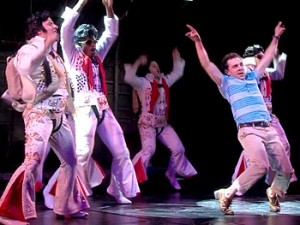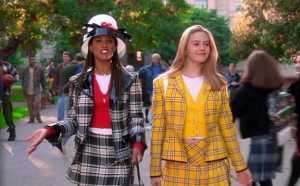In today’s Wall Street Journal I look at the parallel phenomena of the “commodity musical” and film versions of classic novels. Is it possible to adapt familiar source material in a faithful way that is also fresh? Here’s an excerpt.
* * *
Broadway’s latest arrival is “Honeymoon in Vegas,” a new musical that is, like so many other musicals of the past half-decade, a stage version of a popular and well-remembered screen comedy. In the manner of most such shows, it tracks the plot and dialogue of the movie closely, enough so that if you’ve seen the movie, the musical will hold no great surprises for you. That’s why I call these shows “commodity musicals”: They treat their source material not as an occasion for creativity but as a blue-chip investment, an exploitable commodity that is being “repurposed” to make more money.
 It’s nothing new, of course, that “Honeymoon in Vegas” is based on a pre-existing piece of source material. As all musical-comedy buffs know, most musicals have always been adaptations. Take a look at “American Musicals,” the Library of America’s recently published two-volume set containing the scripts of 16 golden-age Broadway musicals written between 1927 and 1969, and you’ll find that four of the shows therein were based on plays and six on novels or short stories….
It’s nothing new, of course, that “Honeymoon in Vegas” is based on a pre-existing piece of source material. As all musical-comedy buffs know, most musicals have always been adaptations. Take a look at “American Musicals,” the Library of America’s recently published two-volume set containing the scripts of 16 golden-age Broadway musicals written between 1927 and 1969, and you’ll find that four of the shows therein were based on plays and six on novels or short stories….
The difference between commodity musicals and their predecessors is that they imitate the films on which they’re based in a way that is unimaginative at best, slavish at worst (and “Honeymoon in Vegas,” which incorporates a couple of newish plot twists, is one of the very best of the lot). This is because they are specifically, sometimes even cynically designed to appeal to casual theatergoers who love the movies on which they’re based so much that they don’t want to be surprised. That’s the fatal flaw of the genre: It’s a sure-fire recipe for creative strangulation….
Hollywood typically runs into similar problems whenever it tries to turn classic works of prose fiction into movies. It’s hugely difficult to film any novel in a way that’s worthy of its source, and the better the book, the tougher the job….
 Not surprisingly, most directors opt to play it safe and go the commodity route, with results that are either inhibitingly close to the source material or watered down to the point of innocuousness. On the rare occasions when a filmed classic takes creative wing, it’s usually one in which the material has been treated with liberating freedom, as in the cases of “Apocalypse Now” and “Clueless,” Amy Heckerling’s 1995 valley-girl rewrite of Jane Austen’s “Emma.” But it is possible to adapt high-quality fiction for the screen in a way that is at once faithful and imaginative. John Huston did it with “The Maltese Falcon” in 1941, and Max Ophüls did it even more successfully seven years later when he and screenwriter Howard Koch turned “Letter from an Unknown Woman” into a darkly romantic evocation of fin-de-siécle Vienna that is every bit as artistically successful as the Stefan Zweig novella on which it is based….
Not surprisingly, most directors opt to play it safe and go the commodity route, with results that are either inhibitingly close to the source material or watered down to the point of innocuousness. On the rare occasions when a filmed classic takes creative wing, it’s usually one in which the material has been treated with liberating freedom, as in the cases of “Apocalypse Now” and “Clueless,” Amy Heckerling’s 1995 valley-girl rewrite of Jane Austen’s “Emma.” But it is possible to adapt high-quality fiction for the screen in a way that is at once faithful and imaginative. John Huston did it with “The Maltese Falcon” in 1941, and Max Ophüls did it even more successfully seven years later when he and screenwriter Howard Koch turned “Letter from an Unknown Woman” into a darkly romantic evocation of fin-de-siécle Vienna that is every bit as artistically successful as the Stefan Zweig novella on which it is based….
* * *
Read the whole thing here.
The theatrical trailer for Max Ophüls’ film version of Letter from an Unknown Woman, starring Joan Fontaine and Louis Jourdan:
